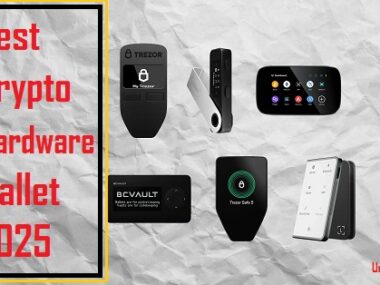Cryptocurrency has become one of the most popular investment vehicles in the world, with millions of people buying, selling, and trading digital assets. However, as the value of cryptocurrencies like Bitcoin, Ethereum, and various altcoins continues to rise, securing your digital assets has become a priority for many investors.
To safely store your cryptocurrency, you need a reliable crypto wallet. Whether you’re new to the crypto space or an experienced investor, choosing the best wallet for your needs is crucial to protecting your investments. In this comprehensive guide, we will explore the best crypto wallets for 2025, highlighting various options such as hardware wallets, software wallets, and mobile wallets.
By the end of this article, you’ll have all the information you need to select the perfect wallet for your cryptocurrency holdings.
Why Do You Need a Crypto Wallet?
Before diving into the best crypto wallets, it’s important to understand why you need one. Cryptocurrency transactions are stored in blockchains, but to access your coins or tokens, you need a crypto wallet. A wallet acts as your digital vault, allowing you to store, send, and receive cryptocurrencies. There are two types of crypto wallets:
- Hot Wallets: These wallets are connected to the internet and are typically used for everyday transactions. They are more convenient but also more vulnerable to hacking and phishing attacks.
- Cold Wallets: Cold wallets store your private keys offline, offering greater security by protecting your assets from online threats. They are ideal for long-term storage.
Types of Crypto Wallets
There are various types of crypto wallets, each offering different features, security, and usability. Here’s an overview of the most popular options:
1. Hardware Wallets: Best for Long-Term Storage and Maximum Security
Hardware wallets are physical devices that store your private keys offline, making them the most secure option for storing cryptocurrency. These wallets are designed to protect your digital assets from online hacking attempts and phishing scams.
Recommended Hardware Wallets:
- Ledger Nano X: One of the most popular hardware wallets, the Ledger Nano X supports over 1,500 cryptocurrencies, including Bitcoin (BTC), Ethereum (ETH), and Shiba Inu Coin (SHIB). It connects via Bluetooth to your mobile or desktop, offering convenience along with high security.
- Key Features: Cold storage, Bluetooth connectivity, multi-asset support, backup and recovery options.
- Pros: Ultimate security, support for 1,500+ cryptocurrencies, mobile and desktop compatibility.
- Cons: Higher upfront cost, requires physical device for transactions.
- Trezor Model T: The Trezor Model T is another highly trusted hardware wallet. It supports a wide range of cryptocurrencies, including Bitcoin and Shiba Inu Coin, and features a touchscreen display for easy use.
- Key Features: Cold storage, touchscreen display, multi-currency support, strong security features.
- Pros: High security, touchscreen for easier navigation, support for 1,000+ cryptocurrencies.
- Cons: Higher price compared to software wallets.
Pros of Hardware Wallets:
- Cold storage for maximum security.
- Full control of private keys.
- Ideal for long-term storage and large cryptocurrency holdings.
Cons of Hardware Wallets:
- Requires an upfront investment.
- Not as convenient for frequent transactions as software wallets.
2. Software Wallets: Convenient for Daily Use and Trading
Software wallets are applications or software programs that store your private keys on your desktop, laptop, or mobile device. They are connected to the internet, making them more convenient for daily use and trading. However, they are also more vulnerable to hacks, especially if not used securely.
Recommended Software Wallets:
- MetaMask: A popular browser extension and mobile app, MetaMask allows you to store Ethereum-based assets (ERC-20 tokens) like Shiba Inu Coin and interact with DeFi platforms such as Uniswap and SushiSwap.
- Key Features: DeFi and dApp integration, user-friendly interface, ERC-20 token support.
- Pros: Easy to use, integrates with DeFi platforms, free to use.
- Cons: Vulnerable to online attacks as a hot wallet, limited to Ethereum-based tokens.
- Exodus: Exodus is a desktop and mobile wallet that supports over 100 cryptocurrencies, including Shiba Inu Coin. It offers a built-in exchange, allowing users to swap tokens directly within the wallet. Exodus also integrates with ShapeShift, allowing users to trade cryptocurrencies without leaving the app.
- Key Features: Built-in exchange, staking support, multi-currency support.
- Pros: Easy-to-use interface, multi-currency support, cross-platform compatibility.
- Cons: Hot wallet, less secure compared to hardware wallets.
Pros of Software Wallets:
- Convenient for daily trading and managing your crypto assets.
- Supports a wide range of cryptocurrencies.
- Free to use and easy to install.
Cons of Software Wallets:
- Vulnerable to online attacks (hacking and phishing).
- Private keys are stored on your device, which can be compromised if not secured properly.
3. Mobile Wallets: Best for On-the-Go Storage and Convenience
Mobile wallets are applications designed for smartphones, allowing users to store, send, and receive cryptocurrencies on the go. Mobile wallets are generally more convenient than desktop software wallets but can be exposed to additional risks such as device theft or malware.
Recommended Mobile Wallets:
- Trust Wallet: One of the most popular mobile wallets, Trust Wallet supports over 160 cryptocurrencies, including Shiba Inu Coin. It is a non-custodial wallet, meaning you control your private keys. Trust Wallet integrates seamlessly with DeFi platforms and allows for staking and token swaps.
- Key Features: Multi-currency support, DeFi integration, private key control, staking.
- Pros: User-friendly, supports ERC-20 and BEP-20 tokens, full control over private keys.
- Cons: Only available on mobile, hot wallet risks.
- Coinomi: Coinomi is a multi-currency wallet that supports Shiba Inu Coin and over 1,700 cryptocurrencies. It is known for its strong privacy features and does not track user data. Coinomi also integrates with DeFi platforms and allows for easy staking of SHIB and other tokens.
- Key Features: Multi-currency support, privacy-focused, DeFi and staking integration.
- Pros: Privacy-focused, multi-currency support, cross-platform availability.
- Cons: Hot wallet, which exposes funds to online risks.
Pros of Mobile Wallets:
- Convenient for on-the-go storage and transactions.
- Supports a wide variety of cryptocurrencies.
- Easy to use and often integrates with DeFi platforms.
Cons of Mobile Wallets:
- Vulnerable to theft, malware, and device loss.
- Hot wallet risks, as mobile wallets are connected to the internet.
Best Practices for Storing Shiba Inu Coin Securely
Regardless of which wallet you choose for Shiba Inu Coin, here are some best practices to ensure your tokens remain safe:
- Use a Hardware Wallet for Long-Term Storage: For maximum security, store large amounts of SHIB in a hardware wallet like Ledger Nano X or Trezor Model T.
- Enable Two-Factor Authentication (2FA): Always enable 2FA on your wallet and exchange accounts to add an extra layer of protection.
- Backup Your Private Keys and Recovery Phrase: Keep multiple secure copies of your private keys or recovery phrases in safe locations to ensure you don’t lose access to your funds.
- Avoid Storing SHIB on Exchanges: For security reasons, transfer large amounts of SHIB from exchanges to non-custodial wallets where you control the private keys.
- Be Wary of Phishing Scams: Always double-check the URL of the wallet or exchange you’re using, and be cautious of phishing websites designed to steal your credentials.
Best Crypto Wallets for Shiba Inu Coin in 2025
In 2025, the best wallet for Shiba Inu Coin depends on your needs. For maximum security, a hardware wallet like the Ledger Nano X is ideal. For frequent use and DeFi participation, Trust Wallet and MetaMask are excellent choices, offering easy access to SHIB and DeFi platforms.
Coinomi is a great option for privacy-conscious users, while Exodus offers a user-friendly solution with integrated token swaps.
Regardless of the wallet you choose, always prioritize security, private key control, and DeFi compatibility to ensure a safe and seamless experience when managing your Shiba Inu Coin tokens.










